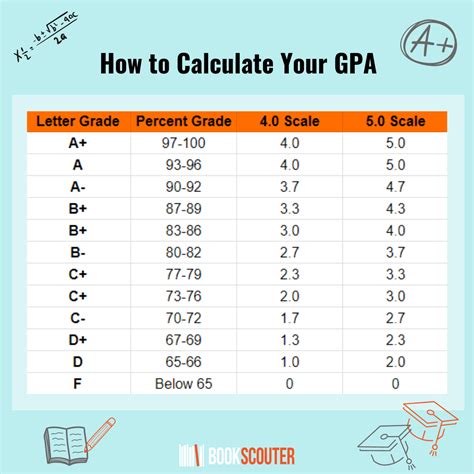Introduction

The SC GPA scale is a metric used to measure academic performance in schools located in South Carolina. It plays a crucial role in evaluating students’ academic progress and determining their eligibility for higher education and scholarships. This comprehensive guide will delve into the details of the SC GPA scale, its calculation, and its significance in the academic journey.
Understanding the SC GPA Scale
The SC GPA scale ranges from 0.0 to 4.0, with 4.0 representing the highest possible grade point average. Each letter grade is assigned a numerical equivalent, as follows:
| Letter Grade | Numerical Equivalent |
|---|---|
| A+ | 4.0 |
| A | 4.0 |
| A- | 3.7 |
| B+ | 3.3 |
| B | 3.0 |
| B- | 2.7 |
| C+ | 2.3 |
| C | 2.0 |
| C- | 1.7 |
| D+ | 1.3 |
| D | 1.0 |
| D- | 0.7 |
| F | 0.0 |
Calculating Your SC GPA
To calculate your SC GPA, you multiply the numerical equivalent of each letter grade by the number of semester hours you received for that course. You then add up the total points and divide by the total number of semester hours attempted. The resulting number is your SC GPA.
For example, if you take four courses in a semester and receive the following grades:
- Course 1: A+ (4.0) x 3 semester hours = 12.0 points
- Course 2: B+ (3.3) x 4 semester hours = 13.2 points
- Course 3: C (2.0) x 3 semester hours = 6.0 points
- Course 4: D- (0.7) x 2 semester hours = 1.4 points
Your total points would be 32.6. Divide this by the total number of semester hours attempted (12), and your SC GPA would be 32.6 / 12 = 2.72.
Significance of SC GPA
A high SC GPA is essential for academic success and post-secondary opportunities. It reflects your academic capabilities and demonstrates your ability to succeed in rigorous coursework. A strong GPA can open doors to higher education, scholarship opportunities, and competitive job markets.
According to a report by the National Center for Education Statistics, the average high school GPA for college-bound seniors is 3.1. To be competitive for admission to selective colleges and universities, it is advisable to maintain a GPA above 3.5.
Strategies for Improving Your SC GPA
Improving your SC GPA requires dedication, hard work, and smart strategies. Here are some effective approaches to consider:
- Attend class regularly: Attendance is crucial for understanding course material and earning participation points.
- Participate actively in class: Engagement in discussions, asking questions, and contributing to group projects can boost your GPA.
- Study effectively: Dedicate sufficient time to study and review course material. Use flashcards, practice problems, and study groups to enhance your understanding.
- Seek help when needed: Don’t hesitate to ask for assistance from teachers, tutors, or classmates. Clarifying concepts and addressing challenges can prevent academic setbacks.
- Take challenging courses: Enrolling in more challenging courses demonstrates your academic rigor and can elevate your GPA.
- Manage your time wisely: Plan your study schedule, prioritize tasks, and allocate time for assignments and extracurricular activities effectively.
Common Mistakes to Avoid
While striving for a high SC GPA, it is important to avoid these common pitfalls:
- Procrastination: Putting off assignments, studying, or seeking help can lead to missed deadlines and poor grades.
- Skipping class: Regular attendance is vital for academic success. Absence from class can result in missed notes, assignments, and participation points.
- Plagiarism: Stealing or presenting others’ work as your own is a serious academic offense that can result in severe penalties.
- Ignoring feedback: Constructive criticism from teachers or peers can help you identify areas for improvement. Ignoring feedback can hinder your academic growth.
- Overwhelming yourself: Taking on too many extracurricular activities or part-time work can compromise your academic performance.
Conclusion
The SC GPA scale is a valuable tool for measuring academic progress and determining eligibility for higher education and scholarships. By understanding the scale, calculating your GPA accurately, employing effective strategies, and avoiding common mistakes, you can maximize your academic potential and achieve your educational goals. Remember, a strong GPA is not simply a number but a reflection of your hard work, dedication, and commitment to learning.
